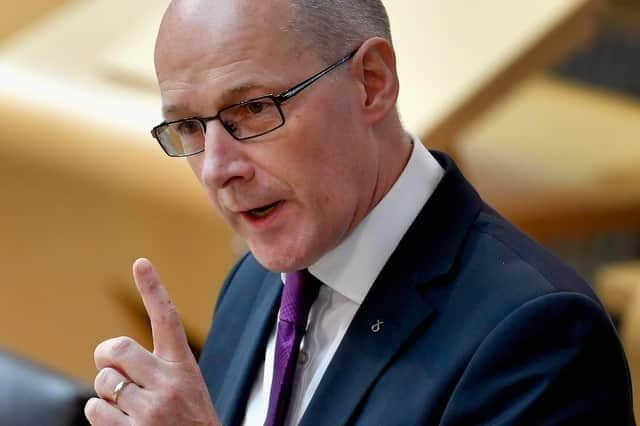'Morally wrong' for wealthy Scots to dodge income tax rises, says John Swinney
John Swinney admitted there is a “risk” that higher earners may take steps to save money.
More than half a million Scots will have to pay more income tax from April under plans set out in the draft Scottish Budget.
Advertisement
Hide AdAdvertisement
Hide AdThe higher rate of tax will rise from 41p to 42p in the pound and the top rate will increase from 46p to 47p. Meanwhile, the top rate threshold will be lowered to £125,140 from £150,000, mirroring changes down south.


Critics have raised concerns the changes will make Scotland a less attractive place to live and work, and pointed to a widening tax gap with the rest of the UK.
Someone earning £50,000 will pay an extra £63.38 in tax, and £1,552.48 more than they would down south, according to the Chartered Institute of Taxation (CIOT). Scots earning £150,000, meanwhile, will pay an additional £2,432.08, and £3,857.88 more than they would elsewhere in the UK.
Professor Graeme Roy, chair of the Scottish Fiscal Commission, previously warned the Government “has to be careful when it thinks about how much additional revenue might come in, just because of people’s potential behavioural responses”.
Those at the top end of the income distribution “tend to have the greatest flexibility to adjust their tax affairs”, he said. “It is not a matter of tax evasion or doing something illegal; they just have greater flexibility to take some of their income as an incorporated entity, to adjust their hours or whatever.”
Mr Swinney, who is also the acting Finance Secretary, was asked about the issue while giving evidence to Holyrood’s finance and public administration committee. He said the Budget “would be without £519 million as a consequence of the decisions I’ve taken to change the tax approach”.
He said: "There is obviously a risk, the Fiscal Commission acknowledges this and sets out the arguments, that there may be steps taken by people to change their tax affairs to avoid these consequences.
"Morally, I think that’s wrong to do that, but it’s technically possible for people to do. Morally, I believe that’s wrong because people living in Scotland have access to a different set of provisions and services than are available in other parts of the United Kingdom.
Advertisement
Hide AdAdvertisement
Hide Ad"So somebody may change their tax arrangements to avoid paying certain amounts of tax but will be prepared to accept that if their child goes to university in Scotland, they will not pay tuition fees, or that they will have access to free prescription charges, or if they have got young children they will have a better proposition in early learning and childcare that’s available than will be available in the rest of the United Kingdom, or that they will pay comparatively lower council tax in Scotland than in other parts of the United Kingdom.
"So there’s a very strong moral dimension to this, whereby people in Scotland are having access to what I called in the Budget statement a social contract of provisions, which I think it’s appropriate that we support in these very tough times through the decisions that we’ve taken on taxation.”
Comments
Want to join the conversation? Please or to comment on this article.
